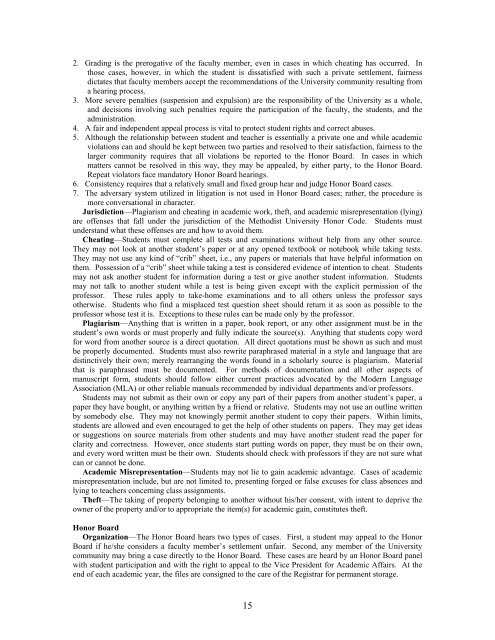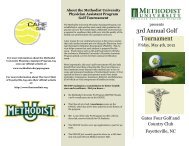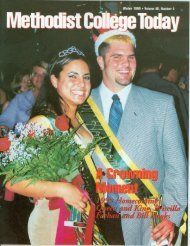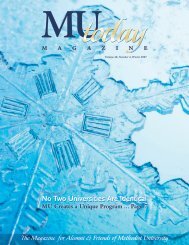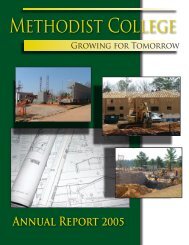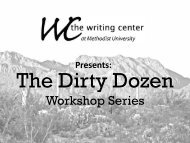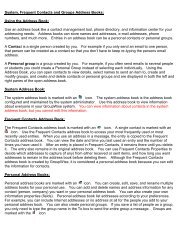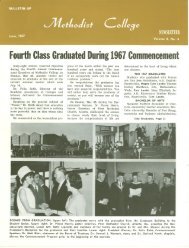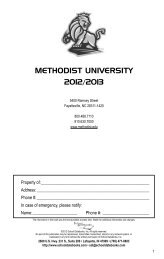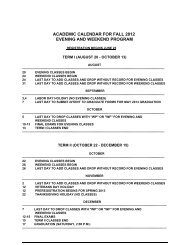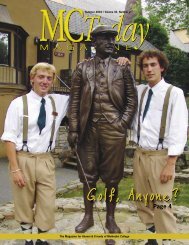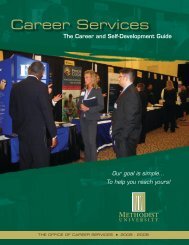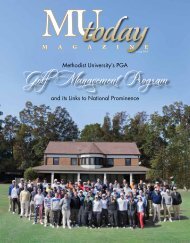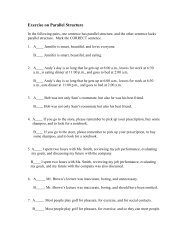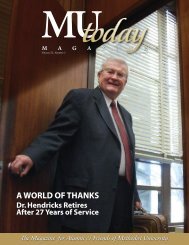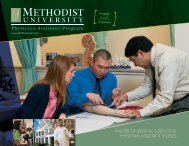Microsoft Word MU 2009-2010.doc - Methodist University
Microsoft Word MU 2009-2010.doc - Methodist University
Microsoft Word MU 2009-2010.doc - Methodist University
- No tags were found...
Create successful ePaper yourself
Turn your PDF publications into a flip-book with our unique Google optimized e-Paper software.
2. Grading is the prerogative of the faculty member, even in cases in which cheating has occurred. Inthose cases, however, in which the student is dissatisfied with such a private settlement, fairnessdictates that faculty members accept the recommendations of the <strong>University</strong> community resulting froma hearing process.3. More severe penalties (suspension and expulsion) are the responsibility of the <strong>University</strong> as a whole,and decisions involving such penalties require the participation of the faculty, the students, and theadministration.4. A fair and independent appeal process is vital to protect student rights and correct abuses.5. Although the relationship between student and teacher is essentially a private one and while academicviolations can and should be kept between two parties and resolved to their satisfaction, fairness to thelarger community requires that all violations be reported to the Honor Board. In cases in whichmatters cannot be resolved in this way, they may be appealed, by either party, to the Honor Board.Repeat violators face mandatory Honor Board hearings.6. Consistency requires that a relatively small and fixed group hear and judge Honor Board cases.7. The adversary system utilized in litigation is not used in Honor Board cases; rather, the procedure ismore conversational in character.Jurisdiction—Plagiarism and cheating in academic work, theft, and academic misrepresentation (lying)are offenses that fall under the jurisdiction of the <strong>Methodist</strong> <strong>University</strong> Honor Code. Students mustunderstand what these offenses are and how to avoid them.Cheating—Students must complete all tests and examinations without help from any other source.They may not look at another student’s paper or at any opened textbook or notebook while taking tests.They may not use any kind of “crib” sheet, i.e., any papers or materials that have helpful information onthem. Possession of a “crib” sheet while taking a test is considered evidence of intention to cheat. Studentsmay not ask another student for information during a test or give another student information. Studentsmay not talk to another student while a test is being given except with the explicit permission of theprofessor. These rules apply to take-home examinations and to all others unless the professor saysotherwise. Students who find a misplaced test question sheet should return it as soon as possible to theprofessor whose test it is. Exceptions to these rules can be made only by the professor.Plagiarism—Anything that is written in a paper, book report, or any other assignment must be in thestudent’s own words or must properly and fully indicate the source(s). Anything that students copy wordfor word from another source is a direct quotation. All direct quotations must be shown as such and mustbe properly documented. Students must also rewrite paraphrased material in a style and language that aredistinctively their own; merely rearranging the words found in a scholarly source is plagiarism. Materialthat is paraphrased must be documented. For methods of documentation and all other aspects ofmanuscript form, students should follow either current practices advocated by the Modern LanguageAssociation (MLA) or other reliable manuals recommended by individual departments and/or professors.Students may not submit as their own or copy any part of their papers from another student’s paper, apaper they have bought, or anything written by a friend or relative. Students may not use an outline writtenby somebody else. They may not knowingly permit another student to copy their papers. Within limits,students are allowed and even encouraged to get the help of other students on papers. They may get ideasor suggestions on source materials from other students and may have another student read the paper forclarity and correctness. However, once students start putting words on paper, they must be on their own,and every word written must be their own. Students should check with professors if they are not sure whatcan or cannot be done.Academic Misrepresentation—Students may not lie to gain academic advantage. Cases of academicmisrepresentation include, but are not limited to, presenting forged or false excuses for class absences andlying to teachers concerning class assignments.Theft—The taking of property belonging to another without his/her consent, with intent to deprive theowner of the property and/or to appropriate the item(s) for academic gain, constitutes theft.Honor BoardOrganization—The Honor Board hears two types of cases. First, a student may appeal to the HonorBoard if he/she considers a faculty member’s settlement unfair. Second, any member of the <strong>University</strong>community may bring a case directly to the Honor Board. These cases are heard by an Honor Board panelwith student participation and with the right to appeal to the Vice President for Academic Affairs. At theend of each academic year, the files are consigned to the care of the Registrar for permanent storage.15


